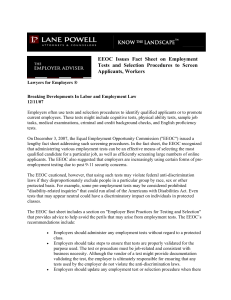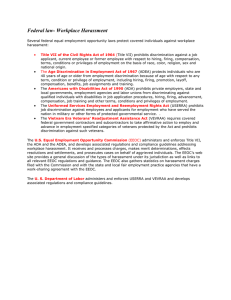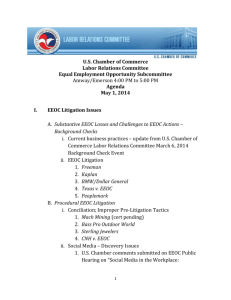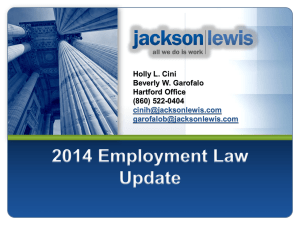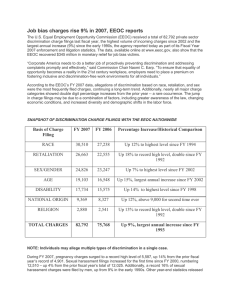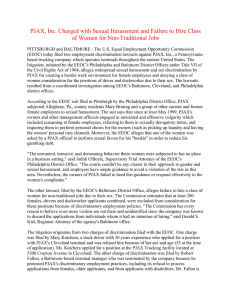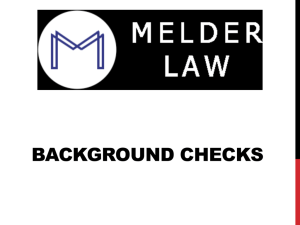Document 13208210
advertisement
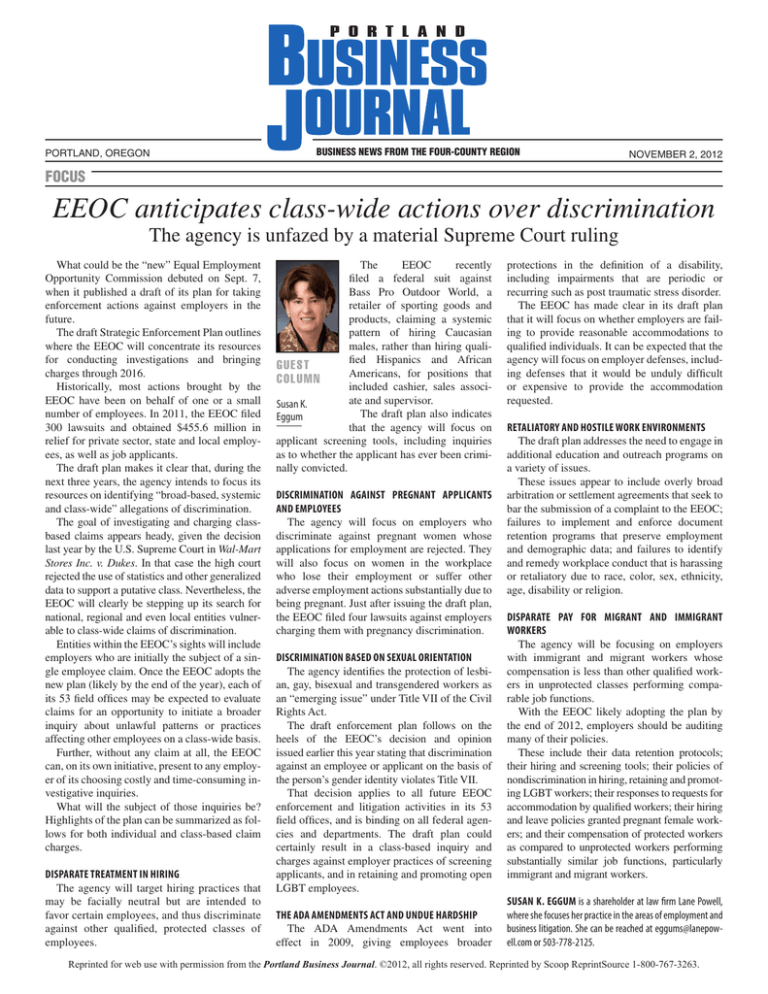
tlandbusinessjournal.com portland business journal | november 2, 2012 EEOC anticipates class-wide actions over discrimination PORTLAND, OREGON BUSINESS NEWS FROM THE FOUR-COUNTY REGION NOVEMBER 2, 2012 FOCUS EEOC anticipates class-wide actions over discrimination The agency isThe unfazed by aismaterial Court ruling agency unfazedSupreme by a material Supreme Court ruling What could be the “new” Equal EmWhat could be the “new” Equal Employment ployment Opportunity Commission Opportunity Commission debuted on Sept. 7, debuted on Sept. 7, when it published a when drafttaking of its plan for taking draft itofpublished its plana for enforcement enforcement actions against employers in the actions against employers in the future. future. The draft Strategic Enforcement Plan The draftwhere Strategic Enforcement Planconcenoutlines outlines the EEOC will where the resources EEOC will for concentrate its resources trate its conducting investigations and bringing charges for conducting investigations and through bringing 2016. through 2016. charges Historically,most most actions brought by Historically, actions brought by the the EEOC been on behalf of aone or EEOC have have been on behalf of one or small a small number of employees. In 2011, number of employees. In 2011, the EEOC filed the EEOC lawsuits and million obtained 300 lawsuitsfiled and300 obtained $455.6 in $455.6 million in relief for private sector, relief for private sector, state and local employstate and local employees, as well as job ees, as well as job applicants. applicants. The planplan makes it clearitthat, during the The draft draft makes clear that, next threethe years, thethree agencyyears, intendsthe to focus its during next agency resources “broad-based, intends on to identifying focus its resources onsystemic identiand class-wide” allegations of discrimination. fying “broad-based, systemic and classThe goal of investigating and charging classwide” allegations of discrimination. Theclaims goal appears of investigating chargbased heady, givenand the decision ingyear class-based heady, last by the U.S. claims Supreme appears Court in Wal-Mart given Inc. thev.decision by high the court U.S. Stores Dukes. Inlast that year case the Supreme Court in Wal-Mart Inc. rejected the use of statistics and otherStores generalized v. Dukes. In that case the high court data to support a putative class. Nevertheless, rethe jected the use of statistics and other genEEOC will clearly be stepping up its search for eralized data to support a putative class. national, regional and even local entities vulnerNevertheless, the EEOC will clearly be able to class-wide of discrimination. stepping up itsclaims search for national, reEntities within thelocal EEOC’s sightsvulnerable will include gional and even entities employers who claims are initially the subject of a sinto class-wide of discrimination. gleEntities employeewithin claim. Once the EEOC adoptswill the the EEOC’s sights new plan (likely by the who end ofare the initially year), eachthe of include employers subject ofoffices a single claim. Once its 53 field mayemployee be expected to evaluate the EEOC the new plan (likely by claims for anadopts opportunity to initiate a broader the endabout of theunlawful year), each of itsor 53 practices field ofinquiry patterns fices may be employees expected on to aevaluate claims affecting other class-wide basis. for an opportunity initiate broader Further, without any to claim at all,athe EEOC inquiry unlawful patterns praccan, on itsabout own initiative, present to anyor employtices affecting other employees on a er of its choosing costly and time-consuming inclass-wide basis. vestigative inquiries. Further, without any claim at all, the What will subject those inquiries be? EEOC can, the on its ownofinitiative, present Highlights of the plan of canits be summarized as folto any employer choosing costly lows for both individual investigative and class-basedinquiclaim and time-consuming charges. ries. What will the subject of those inquiries be? Highlights of the plan can be summaDISPARATE TREATMENT IN HIRING rized follows both individual The as agency will for target hiring practices and that class-based claim charges. may be facially neutral but are intended to Discrimination baseD recently The EEOC on sexua orientation filed a federal suit against The agency identifies the Bass Pro Outdoor World, protection of lesbian, gay,a retailer of sporting goods and bisexual and transgendered products,asclaiming a systemic workers an “emerging ispattern of Title hiring VII Caucasian sue” under of the males, ratherAct. than hiring qualiCivil Rights The Hispanics draft enforcement plan fied and African guest follows on the of that the Americans, for heels positions column EEOC’s includeddecision cashier, and salesopinion associissued this year stating ate andearlier supervisor. Susan K. thatThe discrimination against an draft plan also indicates Eggum employee or applicant on the that the agency will focus on basis of the person’s gender applicant screening tools, including inquiries identity violates Title VII. as to whether the That applicant has ever been crimidecision applies to all nally convicted. future EEOC enforcement and litigation activities in its 53 field offices, and is bind- DISCRIMINATION AGAINST PREGNANT APPLICANTS ing on all federal agencies and departAND EMPLOYEES ments. The draft plan could certainly result agency will focusand on charges employers who in The a class-based inquiry against employer practices screening applicants, discriminate against of pregnant women whose and in retaining and promoting open LGBT applications for employment are rejected. They employees. will also focus on women in the workplace who lose their employment or suffer other the aDaemployment amenDments adverse actions substantially due to act anD unDueJust harDship being pregnant. after issuing the draft plan, The ADA Amendments Act went into the EEOC filed four lawsuits against employers effect in 2009, giving employees broader charging themin with discrimination. protections thepregnancy definition of a disability, including impairments that are peri- DISCRIMINATION BASEDsuch ON SEXUAL ORIENTATION odic or recurring as post traumatic The agency identifies the protection of lesbistress disorder. an,The gay,EEOC bisexualhas andmade transgendered as clear inworkers its draft plan that it will focus onTitle whether an “emerging issue” under VII ofemploythe Civil ers are failing to provide reasonable acRights Act. commodations to qualified individuals. The draft enforcement plan follows on the It can be expected that the will heels of the EEOC’s decision agency and opinion focus earlier on employer deissued this yeardefenses, stating thatincluding discrimination fenses that it would be unduly difficult against an employee or applicant on the basisor of expensive to provide the accommodation the person’s gender identity violates Title VII. requested. That decision applies to all future EEOC enforcement retaliatoryand anDlitigation activities in its 53 field offices, andenvironments is binding on all federal agenhostile work cies and departments. The draft plan to could The draft plan addresses the need encertainly result in aeducation class-based inquiry and gage in additional and outreach charges against practices programs on aemployer variety of issues.of screening These issues appear to overly applicants, and in retaining andinclude promoting open broad employees. arbitration or settlement agreeLGBT protections in the definition of a disability, including impairments that are periodic or recurring such as post traumatic stress disorder. The EEOC has made clear in its draft plan that it will focus on whether employers are failing to provide reasonable accommodations to qualified individuals. It can be expected that the agency will focus on employer defenses, including defenses that it would be unduly difficult or expensive to provide the accommodation requested. RETALIATORY AND HOSTILE WORK ENVIRONMENTS The draft plan addresses the need to engage in additional education and outreach programs on a variety of issues. These issues appear to include overly broad arbitration or settlement agreements that seek to bar the submission of a complaint to the EEOC; failures to implement and enforce document retention programs that preserve employment and demographic data; and failures to identify and remedy workplace conduct that is harassing or retaliatory due to race, color, sex, ethnicity, age, disability or religion. DISPARATE PAY FOR MIGRANT AND IMMIGRANT WORKERS The agency will be focusing on employers with immigrant and migrant workers whose compensation is less than other qualified workers in unprotected classes performing comparable job functions. With the EEOC likely adopting the plan by the end of 2012, employers should be auditing many of their policies. These include their data retention protocols; their hiring and screening tools; their policies of nondiscrimination in hiring, retaining and promoting LGBT workers; their responses to requests for accommodation by qualified workers; their hiring and leave policies granted pregnant female workers; and their compensation of protected workers as compared to unprotected workers performing substantially similar job functions, particularly immigrant and migrant workers. ments that seek to bar the submission of SUSAN K. EGGUM is a shareholder at law firm Lane Powell, a complaint to theACT EEOC; failures to imfavor certain employees, and thus discriminate THE ADA AMENDMENTS AND UNDUE HARDSHIP where she focuses her practice in the areas of employment and and enforce document retention Disparate treatment hiring classes of plement against other qualified, inprotected The ADA Amendments Act went into business litigation. She can be reached at eggums@lanepowThe agency will target hiring practices programs that preserve employment and employees. effect in 2009, giving employees broader ell.com or 503-778-2125. that may be facially neutral but are in- demographic data; and failures to identify and remedy conduct that is ha-Reprinted by Scoop ReprintSource 1-800-767-3263. tended to favor certain Reprinted for web use with employees, permission fromand the Portland Business workplace Journal. ©2012, all rights reserved. thus discriminate against other quali- rassing or retaliatory due to race, color, sex, ethnicity, age, disability or religion. fied, protected classes of employees.
